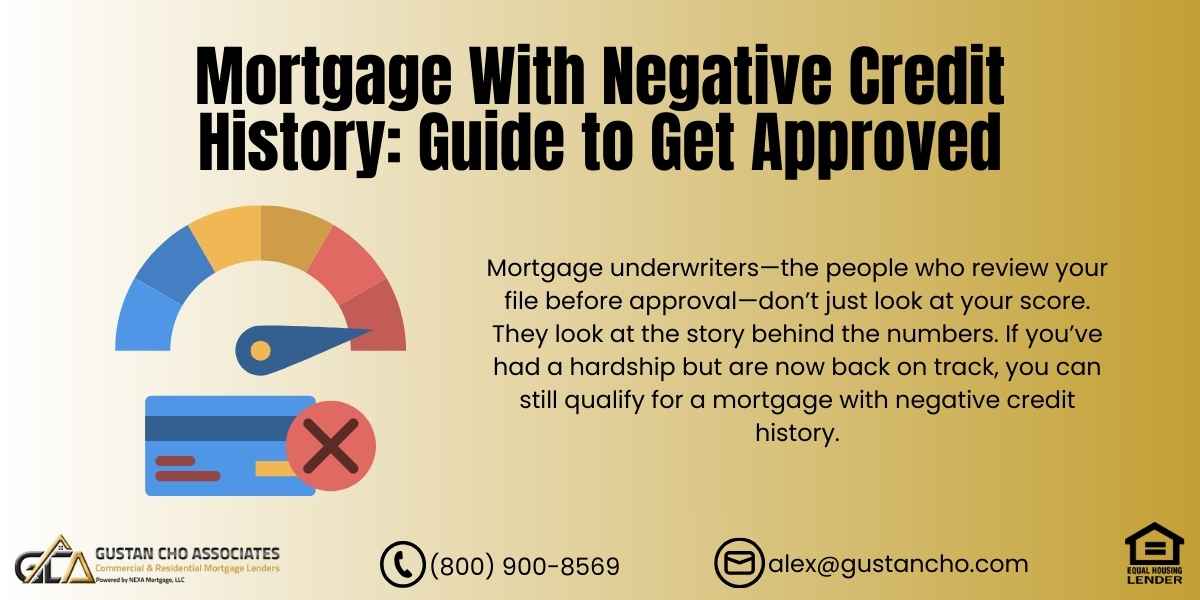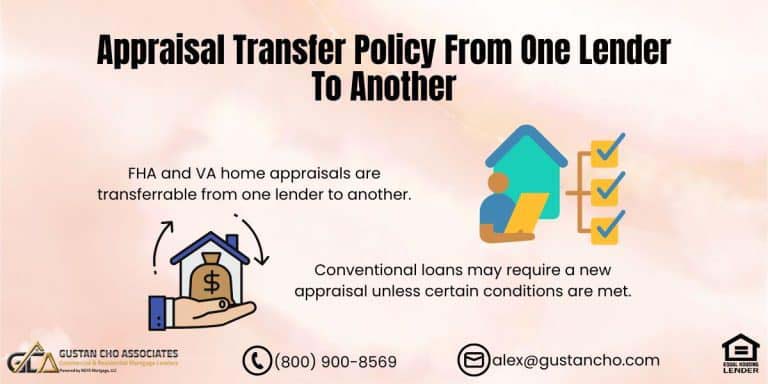Quick Answer
Yes—you can still qualify for a mortgage with negative credit history, even with late payments, collections, or a past bankruptcy/foreclosure. Underwriters focus on your recent payment behavior, income stability, and how you’ve rebuilt since the hardship, not just your score. The right loan program (FHA, VA, Conventional, or Non-QM) makes a big difference.
What You’ll Learn
- What “negative credit history” means to mortgage underwriters (beyond the score)
- How recent late payments affect FHA, VA, Conventional, and Non-QM approvals
- When collections/charge-offs must be paid—and when they typically don’t
- Bankruptcy and foreclosure waiting periods by loan type (and what resets the clock)
- The fastest credit rebuild checklist to improve approval odds in 30–90 days
- Common underwriting “red flags” that cause last-minute denials
- How to choose the right loan path based on your timeline and credit pattern
Jump to Your Situation
- Recent late payments → What matters most + how long you need a clean history
- Collections/charge-offs → When they hurt, when they don’t, and what underwriters calculate
- Bankruptcy/foreclosure → Waiting periods + rebuild checklist to qualify sooner
What Lenders Check by Loan Type (FHA vs VA vs Conventional vs Non-QM)
FHA
- Credit pattern lenders want: Recent on-time history matters most. Underwriters like to see 0x30 over the last 12 months (or a clear, documented reason for late payments), plus re-established tradelines after major events.
- DTI / AUS vs manual note: Many approvals run through AUS, but manual underwriting is possible when AUS won’t approve—expect tighter scrutiny on payment history and compensating factors.
- Reserves note: Not always required, but cash reserves can strengthen approvals—especially with weaker credit, higher DTI, or manual underwriting.
- Documentation note: Standard income/asset docs (paystubs, W-2s, bank statements). If there’s a past hardship, be ready with a short letter of explanation and supporting documents.
Example: Jane had a Chapter 7 bankruptcy two years ago. She rebuilt with three secured credit cards and an auto loan. With a 585 score and 3.5% down, she was approved for an FHA mortgage with negative credit history.
VA
- Credit pattern lenders want: VA emphasizes recent pay history and overall ability to repay. A clean 12-month track record is a common “green flag,” even if there are older negatives.
- DTI / AUS vs manual note: VA uses AUS, but VA underwriting also heavily considers residual income. Files can still work with higher DTI if residual income and overall profile are strong.
- Reserves note: Often minimal, but they can help if the profile is borderline (e.g., higher DTI, variable income, or recent credit events).
- Documentation note: Standard income/asset documentation plus VA items (eligibility/COE, etc.). Underwriters may ask for explanations of recent late payments and the stability of income.
Collections don’t have to be paid, and waiting periods after bankruptcy or foreclosure are shorter than those for Conventional loans. If you’re a veteran, you can qualify for a mortgage with a negative credit history.
Conventional
- Credit pattern lenders want: Conventional is less forgiving of recent delinquencies. Lenders typically want a strong, consistent payment pattern and fewer recent derogatory events; higher scores generally improve pricing and approval odds.
- DTI / AUS vs manual note: Conventional is usually AUS-driven; manual options are limited compared to FHA. If AUS findings are tight, compensating factors (assets, down payment, substantial income) become more important.
- Reserves note: Reserve expectations can be higher depending on scenario (multi-unit, second home, investment property, higher loan amounts, or weaker overall file).
- Documentation note: Traditional full-doc verification is standard (income, assets, employment). Expect closer review of credit depth (number/age of accounts) and any recent new debt.
Conventional might not be your first option if you’re seeking a mortgage with negative credit history, but after rebuilding, it could lower your mortgage insurance costs.
Worried About Negative Credit History? Here’s How Underwriters View It
Learn how mortgage underwriters assess negative credit history and how to improve your chances of approval.
Non-QM
- Credit pattern lenders want: Non-QM looks more at the ability to repay and recent behavior than a perfect score. Many programs tolerate lower scores and past events if the last 12–24 months show improvement.
- DTI / AUS vs manual note: Typically no agency AUS (it’s lender/program-specific underwriting). DTI rules vary by product—some focus more on cash flow, while others focus on the property’s income.
- Reserves note: Reserves are commonly expected (often more than FHA/VA), especially for self-employed borrowers, investors, or higher-risk credit profiles.
- Documentation note: Depends on the product:
- Bank statement loans: 12–24 months of bank statements
- DSCR loans: lease/rent schedule + property cash flow
- Asset depletion: verified liquid/retirement assets
- Documentation is flexible, but it must clearly prove income/cash flow and funds to close.
These programs often allow lower credit scores and flexible rules, making them a strong option for mortgages with negative credit histories.
What Does Negative Credit History Mean in Mortgage Underwriting?
“Negative credit history” means there are marks on your credit report that show financial struggles. These can include:
- Late or missed payments
- Collections and charge-offs
- Judgments or tax liens
- Bankruptcy
- Foreclosure or short sale
Mortgage underwriters—the people who review your file before approval—don’t just look at your score. They look at the story behind the numbers. If you’ve had a hardship but are now back on track, you can still qualify for a mortgage with negative credit history.
Can You Get a Mortgage With Negative Credit History in 2026?
Yes, absolutely. In 2026, FHA, VA, USDA, and even some Conventional and non-QM lenders will allow people with imperfect credit to buy a home.
At Gustan Cho Associates, we follow agency guidelines without extra overlays. That means if FHA, VA, or Fannie Mae says you qualify, we approve you—even if another bank already said no.
This is why working with a lender who understands mortgages with negative credit history makes all the difference.
How Underwriters View Negative Credit History
Underwriters ask three big questions when they see negative marks:
What Caused It?
Underwriters seek to understand the circumstances surrounding negative credit marks. They assess whether events like job loss, medical emergencies, divorce, or poor money management contributed to the issues, as the context can significantly impact their evaluation of the risk involved in lending.
How Long Ago Did it Happen?
The age of negative credit marks plays a crucial role in underwriting decisions. Generally, older issues are viewed with less severity, as they indicate a longer time during which the applicant may have improved their financial behavior and stability.
What Have You Done Since?
Underwriters focus on the steps taken by the applicant since the negative marks appeared. Demonstrating a commitment to rebuilding credit, such as avoiding new late payments and managing finances responsibly, can greatly influence an underwriter’s confidence in an applicant’s ability to handle future obligations.
Example: If you had a bankruptcy three years ago but now have three credit cards paid on time and a steady income, you’re in a better position than someone with small collections popping up yearly.
The key is showing you’ve learned and moved forward. That’s how you get approved for a mortgage with negative credit history.
Negative Credit History? Learn How Underwriters View It and What You Can Do
Discover strategies to overcome negative credit history and get approved for your mortgage.
Common Borrower Questions About Mortgages With Negative Credit History
Do I have to pay off collections to get a mortgage?
Not for FHA or VA. Conventional may require it if the balance is high.
Can I get a mortgage after bankruptcy?
Yes. FHA requires a 2-year wait after Chapter 7. VA is also 2 years. Conventional requires 4.
What about after foreclosure?
FHA = 3 years. VA = 2 years. Conventional = 7 years.
Even with these rules, you can qualify for a mortgage with negative credit history as long as you’ve re-established credit.
How to Rebuild Credit Before Applying for a Mortgage
If you want the best shot at approval, here’s a step-by-step roadmap:
- Get 3–5 secured credit cards. Use them monthly and pay in full.
- Keep balances under 30% of your limit. (If limit = $500, keep under $150.)
- Avoid new late payments. Even one hurts.
- Add a small installment loan (like a credit builder loan or auto loan).
- Check your credit reports for errors at AnnualCreditReport.com.
- Be patient. Negative items lose power over time.
Following this plan for 12 months can boost your approval odds for a mortgage with negative credit history.
Real-Life Borrower Stories
Case 1: Divorce and Bankruptcy
Sarah had a 720 score until her divorce. She filed Chapter 7, lost her home, and thought she’d never qualify again. After 2 years, she had three credit cards and no new late payments. Gustan Cho Associates approved her FHA loan with a 590 score.
Case 2: Ongoing Collections
Tom never filed for bankruptcy but had years of collections and late payments. With no rebuilding, his file was too risky. The lesson: Underwriters want to see effort after hardship.
These examples show why some people get approved for a mortgage with negative credit history—and others don’t.
What Underwriters Like to See After Bad Credit
When reviewing your file, underwriters love to see:
- Re-established credit: Established new credit accounts demonstrate to underwriters that you’ve taken proactive steps to manage your finances responsibly. This signals a shift towards positive financial behavior, indicating you’re committed to rebuilding your creditworthiness.
- On-time payments: Consistently making on-time payments over the past year or two is crucial in showing underwriters that you are reliable and financially stable. This track record reflects a commitment to meeting financial obligations and helps to rebuild trust in your creditworthiness.
- Stable income: A steady paycheck from a reliable job gives underwriters confidence that you can handle your mortgage payments and other bills. Job stability is a big deal when they look at your overall financial situation and how likely you are to pay back what you owe.
- Low debt-to-income ratios: A low debt-to-income ratio indicates that your monthly debts are manageable compared to your income, which is an important factor in loan approvals. This helps underwriters assess your ability to balance your financial obligations effectively and reduces the risk of lending to you.
Show these, and you can turn your story around—even with a mortgage with negative credit history.
Top Mistakes to Avoid If You Have Negative Credit
- Applying for too many new accounts at once. Submitting applications for several credit cards or loans simultaneously may indicate to lenders that you are experiencing financial difficulties. This may lead to a more in-depth review of your credit profile and result in several hard inquiries on your credit report, which can further decrease your credit score.
- Letting credit card balances max out. Using all the available credit on your cards can damage your credit utilization ratio and negatively impact your credit score. High balances compared to your limits can signal poor money management to lenders, making them hesitant to approve new credit or loans.
- Ignoring small collections that could lead to judgments. Neglecting to address small debts that have gone to collections can escalate the situation, potentially resulting in legal judgments against you. These judgments can severely damage your credit score and make it much more challenging to secure favorable credit terms in the future.
- Missing payments after bankruptcy or foreclosure. Even after a bankruptcy or foreclosure, staying current on any remaining debts is crucial, as missed payments can further harm your credit profile. This can hinder your ability to rebuild your credit and may complicate your efforts to qualify for loans or mortgages down the line.
These mistakes make it harder to qualify for a mortgage with negative credit history.
Will bankruptcy or foreclosure stop me from buying?
Not forever—guidelines allow approval after certain waiting periods.
How Negative Credit History Affects More Than Just Mortgages
A bad credit history can cause many problems beyond just making it tough to get a mortgage. It might mean you pay more for car insurance, need a higher security deposit, and face more hurdles when looking for jobs, especially in finance, government, or positions where trust is key.
Plus, it could mess with your chances of getting certain professional licenses, like those needed for real estate agents or loan officers.
That’s why rebuilding is smart even before you’re ready to buy. You’ll be in a stronger position when you apply for a mortgage with a negative credit history.
Why Work With Gustan Cho Associates?
Other lenders add overlays—extra rules on top of FHA, VA, or Conventional guidelines—but we don’t.
At Gustan Cho Associates, you get:
- No overlays on FHA, VA, USDA, or Conventional loans
- Credit scores down to 500 accepted
- Manual underwriting for more challenging cases
- Approvals that other lenders can’t do
If you’ve been denied before, call us. We may approve your mortgage with negative credit history when others won’t.
Final Thoughts: Your Mortgage With Negative Credit History Is Possible
A negative credit history does not end your homeownership dreams. The most important step is to show lenders you’ve changed:
- Re-establish credit
- Keep payments on time
- Maintain a steady income
At Gustan Cho Associates, we believe in second chances. We’re here to guide you, whether you had a bankruptcy, foreclosure, or just a few late payments.
Borrowers who need a five-star national mortgage company licensed in 50 states with no overlays and who are experts on mortgage with negative credit history, please contact us at 800-900-8569, text us for a faster response, or email us at alex@gustancho.com. The team at Gustan Cho Associates is available 7 days a week, on evenings, weekends, and holidays.
Frequently Asked Questions About Mortgage with Negative Credit History:
Can I Get a Mortgage With Negative Credit History?
Yes. Many borrowers with late payments, collections, or past bankruptcy/foreclosure still qualify—especially if your most recent 12 months show improved on-time payments and stable income. The best fit (FHA, VA, Conventional, or Non-QM) depends on how recent the negative items are and what you’ve done since.
What Credit Score do I Need for an FHA if I have Bad Credit?
FHA guidelines commonly allow 500+ with 10% down and 580+ with 3.5% down, assuming you meet other requirements and your file’s overall risk is acceptable. Some lenders add stricter “overlays,” so approvals can vary by lender.
How Many Late Payments Will Disqualify Me from a Mortgage?
There’s no universal “number,” but lenders care most about recency and pattern. A single older 30-day late payment is usually less damaging than repeated late payments in the last 12 months—especially on housing-related debts. Many lenders want to see a clean recent stretch before approving.
Can I Buy a House if I have Collections or Charge-Offs?
Often, yes—but it depends on the loan type, balances, and whether the underwriter must count a monthly payment for unpaid accounts. Some programs are more flexible, while others may require payoff or a plan if balances are high or certain conditions apply.
Do I have to Pay Off Collections to Get a Mortgage?
Not always. Some scenarios allow approvals with unpaid collections, while others may require payoff—especially if the balances are large, the debt is recent, or the loan type/lender requires it. The safest move is to have your loan officer run AUS and confirm what your findings require.
How Long After a Chapter 7 Bankruptcy Can I Get a Mortgage?
A common guideline for FHA is 2 years after the Chapter 7 discharge (not the filing date). Conventional waiting periods are often longer (up to 4 years after discharge, depending on the scenario).
Can I Get a Mortgage While I’m in Bankruptcy (Chapter 13)?
Usually, you can’t close a standard mortgage while the case is unresolved unless the program and court/trustee allow it and the lender approves the risk. Requirements vary a lot by loan type and lender, so this is a “case-by-case + documentation-heavy” situation.
How Long After Foreclosure Can I Repurchase a House?
FHA commonly requires 3 years after the foreclosure is complete (measured from the completion/transfer date, not the first missed payment). Conventional loans often require 7 years, with limited exceptions in specific situations.
What do Underwriters Look at Besides My Credit Score?
They focus on ability and willingness to repay: recent payment history, income stability, debt-to-income ratio, cash to close, and whether you’ve re-established credit after a hardship. This is why a mortgage with negative credit history is still possible if the recent trend is strong.
What Can I do in the Next 30–90 Days to Qualify Faster?
Focus on high-impact moves: pay everything on time, keep card balances low, avoid new debt/inquiries, document stable income, and clear up any errors on your credit reports. These steps can strengthen AUS results and improve pricing—especially when applying for a mortgage with negative credit history.
This article about “Mortgage With Negative Credit History: Guide to Get Approved” was updated on February 3rd, 2026.
How Do Underwriters View Your Negative Credit History?
Get the facts on how underwriters evaluate negative credit marks and how you can improve your loan chances.










